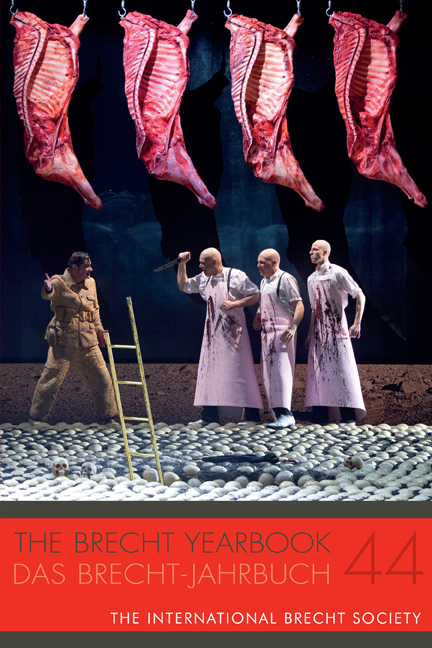Book contents
- Frontmatter
- Officers of the International Brecht Society
- Contents
- Editorial
- List of Abbreviations
- Brecht, Günter Kunert, and Edgar Lee Masters
- Brecht’s Dramatic Fragments
- Pure Joke: The Comedy of Theater since Brecht
- New Brecht Research
- Book Reviews
- Notes on the Contributors
- Now at De Gruyter Exilforschung Ein Internationales Jahrbuch
Di dray groschn opere: Bertolt Brecht on the Yiddish Stage
Published online by Cambridge University Press: 09 February 2021
- Frontmatter
- Officers of the International Brecht Society
- Contents
- Editorial
- List of Abbreviations
- Brecht, Günter Kunert, and Edgar Lee Masters
- Brecht’s Dramatic Fragments
- Pure Joke: The Comedy of Theater since Brecht
- New Brecht Research
- Book Reviews
- Notes on the Contributors
- Now at De Gruyter Exilforschung Ein Internationales Jahrbuch
Summary
On December 29, 1962, the curtain rose on the world premiere of Bertolt Brecht and Kurt Weill's Die Dreigroschenoper ( The Threepenny Opera) in Yiddish translation. The stage where this happened was neither in New York City nor in Warsaw, both traditional centers of Yiddish culture, but in Bucharest, Romania. In a nineteenth-century, Neoclassical building on the left bank of the Dâmboviţa River, in the heart of the Jewish quarter, situated between the roads Văcăreşti and Dudeşti, the ensemble of Teatrul Evreiesc de Stat (TES/Jewish State Theater) made history even if the world did not take notice. Shulem Rubinger had translated the text from the German, and George Teodorescu directed the production. The premiere was also a milestone for Brecht performances in Romania in general, as Die Dreigroschenoper had not been previously performed in the country. I found a copy of the translation (believed lost due to the precarious condition of TES's archive) in the Israil Bercovici Collection at Tel Aviv University in May 2017. In this article, I analyze TES's performance in the context of communist Romania's changing cultural policies at the end of the 1950s and beginning of the 1960s. If Brecht and Weill had transferred John Gay's Beggars’ Opera into nineteenth-century London to roast Weimar Germany in the late 1920s, did Teodorescu's production similarly attempt to criticize the opportunism and bourgeoning corruption in the Romanian society of his time? Before I answer this question based on the performance's playbill and reviews and the play's translation, I will provide a brief overview of the history of Yiddish theater and of Brecht's reception in Romania to better contextualize my analysis.
Yiddish Theater in Romania
Researchers worldwide agree that Avrom Goldfaden (1840–1908) counts as the father of Yiddish theater. Goldfaden, who was from Staro-Konstantinov in the province of Volhynia in today's Ukraine, was a dandy who straddled the traditions of the typical Eastern European shtetlekh culture with that of the Jewish Enlightenment, Haskalah. As Nahma Sandrow points out, “[h]e took the title himself, and no one has disputed it” (40) since. His first Yiddish theater performance is said to have taken place in Jassy, a city in Eastern Romania, in 1876 in a beer garden called Pomul Verde (Green Tree) (see Sandrow 41).
- Type
- Chapter
- Information
- The Brecht Yearbook / Das Brecht-Jahrbuch 44 , pp. 202 - 221Publisher: Boydell & BrewerPrint publication year: 2019

